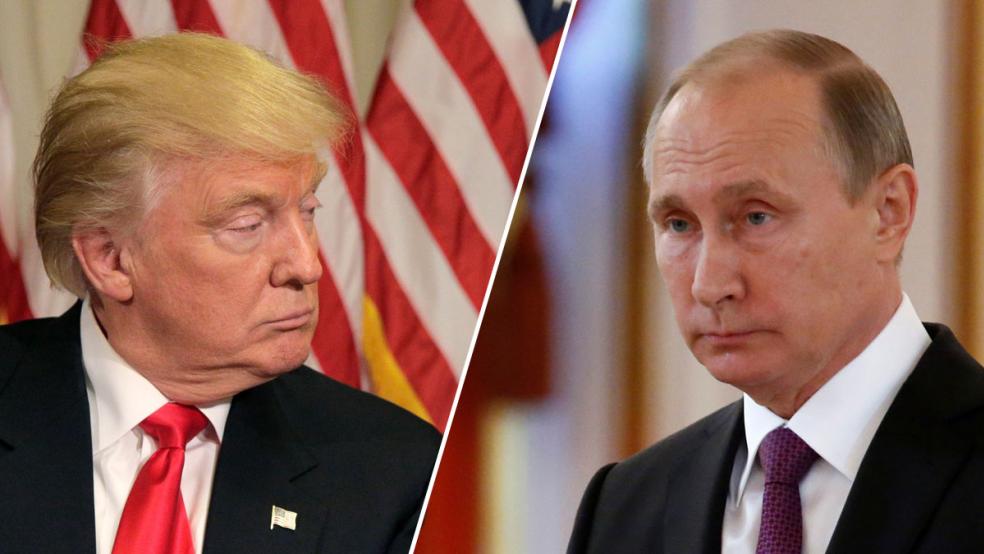Donald Trump has declared that things will be “different” on the international stage when he is in the Oval Office, promising among other things that he will mend relations with Russia, achieve peace in the Middle East, and get tough on Iran. But the complicated foreign policy world that the President-elect is inheriting may not bend itself to his will quite as easily as he appears to expect.
On Tuesday, two powerful Republican members of the Senate made it clear that they have no intention of allowing the U.S. Intelligence Community’s assessment that Russian-backed computer hackers interfered in the U.S. presidential election to be swept under the rug, even though the incoming president from their own party says he doesn’t believe it really happened.
Related: Trump Doubles Down on the Threat of a Nuclear Arms Race
Sens. John McCain (R-AZ) and Lindsey Graham (R-SC) gave an interview to CNN during a trip to the Baltic nation of Estonia and promised that there would be a full investigation of Russian involvement in the presidential election, which U.S. intelligence agencies believe was given the green light by Russian President Vladimir Putin -- whether President-elect Trump likes it or not.
“There are 100 United States senators...I would say that 99 of us believe the Russians did this, and we’re going to do something about it,” Graham told CNN’s Jim Sciutto. “We’re going to put sanctions together that hit Putin as an individual and his inner circle for interfering in our election, and they're doing it all over the world -- not just in the United States.”
McCain continued to express his worries about Trump’s pick for secretary of state, Exxon Mobil CEO Rex Tillerson, saying that that the oilman’s close ties to Russia concern him. McCain’s worries echo those of many in Congress who are dubious about Trump’s professed desire to bring the U.S. and Russia closer together at a time when the Kremlin’s military adventures in Ukraine and Syria are attracting international censure.
But Trump’s willingness to embrace Russia, and Tillerson’s business ties to the country and a reportedly warm personal relationship with Putin, will only go so far in a world where Russian and American interests are sharply diverging, warns James Dobbins, a senior fellow and distinguished chair in diplomacy and security at the Rand Corporation.
Related: Trump’s Nuclear Tweet: A Response to Putin?
“[A]ssuming he is confirmed as secretary of state, [Tillerson] will immediately face an unusually broad array of challenges,” Dobbins writes. “Some of these derive from the unusually disordered state of the world, others from the unusually wide uncertainty about the new American president's intentions.”
Among the biggest jobs Tillerson will face, Dobbins says, will be balancing Trump’s promises about getting tough on Iran with the reality that the Islamic Republic is a de facto partner of Russia’s in the ongoing conflict in Syria.
“Trump seems inclined to accommodate Russia while confronting Iran,” Dobbins writes. “In Syria, where the two are effectively allied, this does not seem feasible. Neither does Russia seem likely to join in abrogating the five power nuclear accord with Iran, or in re-imposing international sanctions. Neither will it be possible to both push back Iran and reduce American exposure in this volatile region. Choices will need to be made.”
And Russia doesn’t appear inclined to do much in the way of making things less complicated for Trump in the Middle East.
Related: Trump’s Nuke Talk Could Break the Budget or Much, Much Worse
Last week, for example, Trump took the unusual step, for a president-elect, of calling for the current administration to take specific action on an upcoming vote in the United Nations Security Council. The Security Council was about to vote on a resolution censuring Israel for its construction of settlements on both disputed territory and on territory that belongs to Palestinians.
The rumor circulating was that the U.S., in a departure from normal practice, would abstain from voting on the resolution rather than exercise its Security Council veto power.
In a Facebook post, Trump declared, “The resolution being considered at the United Nations Security Council regarding Israel should be vetoed. As the United States has long maintained, peace between the Israelis and the Palestinians will only come through direct negotiations between the parties, and not through the imposition of terms by the United Nations. This puts Israel in a very poor negotiating position and is extremely unfair to all Israelis.”
Having made his position abundantly clear, Trump was handing his ostensible future ally, Putin, an opportunity to show some good faith.
Related: How Team Trump Is Changing the Rules of the Media Game
Israeli Prime Minister Benjamin Netanyahu reportedly made a last-minute phone call to Putin on the day of the vote, urging the Russian President, who controls his country’s Security Council veto, to block the resolution. The result wasn’t exactly an endorsement of the Israeli position.
According to the Israeli newspaper Ha’aretz, the Russian ambassador to the United Nations made a pro forma effort to at least delay the vote last week, complaining that there had not been enough time to debate the resolution. But when it came to a vote, the Russian ambassador not only allowed the measure to proceed without a veto but voted in favor of it.





